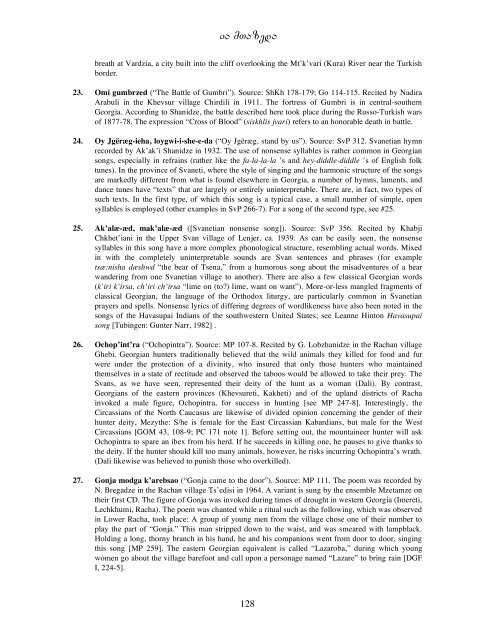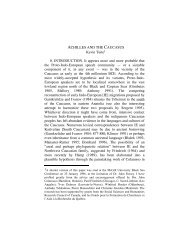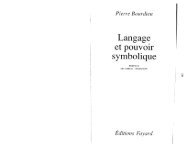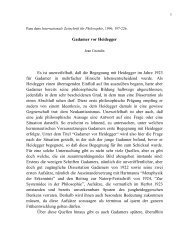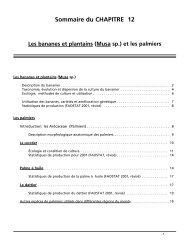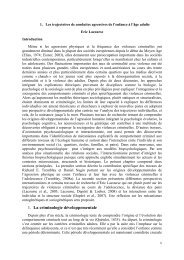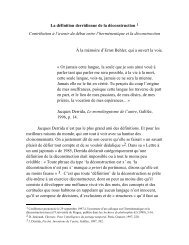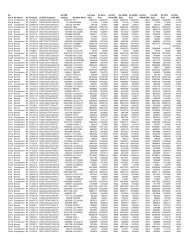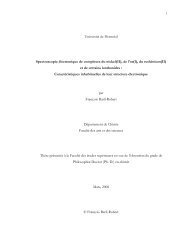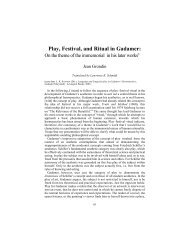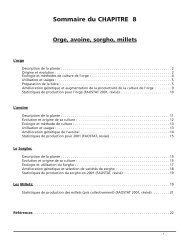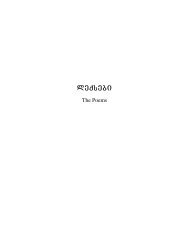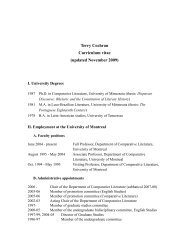Create successful ePaper yourself
Turn your PDF publications into a flip-book with our unique Google optimized e-Paper software.
ia mtazeda<br />
breath at Vardzia, a city built into the cliff overlooking the Mt’k’vari (Kura) River near the Turkish<br />
border.<br />
23. Omi gumbrzed (“The Battle of Gumbri”). Source: ShKh 178-179; Go 114-115. Recited by Nadira<br />
Arabuli in the Khevsur village Chirdili in 1911. The fortress of Gumbri is in central-southern<br />
Georgia. According to Shanidze, the battle described here took place during the Russo-Turkish wars<br />
of 1877-78. The expression “Cross of Blood” (siskhlis jvari) refers to an honorable death in battle.<br />
24. Oy Jgëræg-ieha, loygwi-i-she-e-da (“Oy Jgëræg, stand by us”). Source: SvP 312. Svanetian hymn<br />
recorded by Ak’ak’i Shanidze in 1932. The use of nonsense syllables is rather common in Georgian<br />
songs, especially in refrains (rather like the fa-la-la-la ’s and hey-diddle-diddle ’s of English folk<br />
tunes). In the province of Svaneti, where the style of singing and the harmonic structure of the songs<br />
are markedly different from what is found elsewhere in Georgia, a number of hymns, laments, and<br />
dance tunes have “texts” that are largely or entirely uninterpretable. There are, in fact, two types of<br />
such texts. In the first type, of which this song is a typical case, a small number of simple, open<br />
syllables is employed (other examples in SvP 266-7). For a song of the second type, see #25.<br />
25. Ak’alæ-æd, mak’alæ-æd ([Svanetian nonsense song]). Source: SvP 356. Recited by Khabji<br />
Chkhet’iani in the Upper Svan village of Lenjer, ca. 1939. As can be easily seen, the nonsense<br />
syllables in this song have a more complex phonological structure, resembling actual words. Mixed<br />
in with the completely uninterpretable sounds are Svan sentences and phrases (for example<br />
tsæ:nisha dæshwd “the bear of Tsena,” from a humorous song about the misadventures of a bear<br />
wandering from one Svanetian village to another). There are also a few classical Georgian words<br />
(k’iri k’irsa, ch’iri ch’irsa “lime on (to?) lime, want on want”). More-or-less mangled fragments of<br />
classical Georgian, the language of the Orthodox liturgy, are particularly common in Svanetian<br />
prayers and spells. Nonsense lyrics of differing degrees of wordlikeness have also been noted in the<br />
songs of the Havasupai Indians of the southwestern United States; see Leanne Hinton Havasupai<br />
song [Tubingen: Gunter Narr, 1982] .<br />
26. Ochop’int’ra (“Ochopintra”). Source: MP 107-8. Recited by G. Lobzhanidze in the Rachan village<br />
Ghebi. Georgian hunters traditionally believed that the wild animals they killed for food and fur<br />
were under the protection of a divinity, who insured that only those hunters who maintained<br />
themselves in a state of rectitude and observed the taboos would be allowed to take their prey. The<br />
Svans, as we have seen, represented their deity of the hunt as a woman (Dali). By contrast,<br />
Georgians of the eastern provinces (Khevsureti, Kakheti) and of the upland districts of Racha<br />
invoked a male figure, Ochopintra, for success in hunting [see MP 247-8]. Interestingly, the<br />
Circassians of the North Caucasus are likewise of divided opinion concerning the gender of their<br />
hunter deity, Mezythe: S/he is female for the East Circassian Kabardians, but male for the West<br />
Circassians [GOM 43, 108-9; PC 171 note 1]. Before setting out, the mountaineer hunter will ask<br />
Ochopintra to spare an ibex from his herd. If he succeeds in killing one, he pauses to give thanks to<br />
the deity. If the hunter should kill too many animals, however, he risks incurring Ochopintra’s wrath.<br />
(Dali likewise was believed to punish those who overkilled).<br />
27. Gonja modga k’arebsao (“Gonja came to the door”). Source: MP 111. The poem was recorded by<br />
N. Bregadze in the Rachan village Ts’edisi in 1964. A variant is sung by the ensemble Mzetamze on<br />
their first CD. The figure of Gonja was invoked during times of drought in western Georgia (Imereti,<br />
Lechkhumi, Racha). The poem was chanted while a ritual such as the following, which was observed<br />
in Lower Racha, took place: A group of young men from the village chose one of their number to<br />
play the part of “Gonja.” This man stripped down to the waist, and was smeared with lampblack.<br />
Holding a long, thorny branch in his hand, he and his companions went from door to door, singing<br />
this song [MP 259]. The eastern Georgian equivalent is called “Lazaroba,” during which young<br />
women go about the village barefoot and call upon a personage named “Lazare” to bring rain [DGF<br />
I, 224-5].<br />
128


